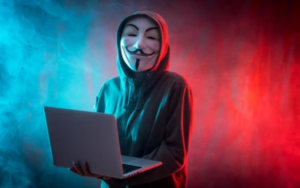The story of Anonymous is one of the most intriguing and captivating tales of the digital age. This loosely-affiliated group of internet activists and hacktivists has evolved from its humble beginnings on the infamous imageboard, 4chan, into a formidable force known for its cyberattacks and online activism. In this article, we will explore the origins, evolution, and key actions of Anonymous.

Birth on 4chan
Anonymous was born in the early 2000s within the depths of 4chan, a controversial and often chaotic online forum. The users of 4chan were known for their love of internet memes and pranks, but it was within this chaotic environment that Anonymous began to take shape. At that time, Anonymous was more of an internet subculture, with its members using the tagline “We are Anonymous. We are Legion. We do not forgive. We do not forget.”
One of the earliest notable actions of Anonymous was “Project Chanology” in 2008, a campaign against the Church of Scientology. This marked the first time that Anonymous as a collective made its presence felt beyond the confines of the internet. They organized protests, distributed literature, and even hacked Scientology websites.
Hacktivism and Online Activism
As Anonymous continued to evolve, it transitioned from online pranks and protests to hacktivism and online activism. Hacktivism involves the use of hacking techniques to promote social or political change. This shift in focus marked a significant change in the group’s identity and mission.
Anonymous started participating in political events and advocating for issues such as internet freedom, government transparency, and social justice. They lent their support to the Arab Spring movements and played a role in the Occupy Wall Street protests. The group’s actions garnered global attention and demonstrated the power of decentralized, collective action in the digital age.
Operation Payback and DDoS Attacks
One of the most well-known tactics employed by Anonymous is Distributed Denial of Service (DDoS) attacks. In these attacks, a target’s website or online service is flooded with an overwhelming amount of traffic, effectively rendering it inaccessible. Operation Payback, launched in 2010, was one of the first instances of Anonymous using DDoS attacks on a large scale.
Operation Payback primarily targeted organizations and corporations that were seen as acting against the interests of the open internet and online freedom. This operation brought down the websites of various organizations, including the Motion Picture Association of America (MPAA) and the Recording Industry Association of America (RIAA), in response to their stance on internet piracy.
Defending Online Freedom
Another noteworthy campaign by Anonymous was in defense of online freedom. They protested against the Stop Online Piracy Act (SOPA) and the Protect IP Act (PIPA), two pieces of legislation that many believed threatened free expression on the internet. Anonymous played a vital role in raising awareness about the potential consequences of these bills and mobilized online activists to oppose them.
Their actions, including DDoS attacks on websites of SOPA and PIPA supporters, contributed to the eventual shelving of the proposed legislation. This was a significant victory for online activists, demonstrating the power of collective action and grassroots efforts in the digital age.
Challenges and Controversies
Anonymous’s activities have not been without their share of controversies. Their decentralized structure allows anyone to claim affiliation with Anonymous, leading to actions that may not align with the group’s original intentions. Some individuals have used the Anonymous name for personal gain or malicious purposes, tarnishing the group’s reputation.
The use of DDoS attacks and hacking techniques has also faced criticism. Critics argue that these actions can cause harm to innocent parties and have unintended consequences. The legality of some of their activities has been a subject of debate, as they walk a fine line between activism and vigilantism.
The Guy Fawkes Mask
One of the iconic symbols associated with Anonymous is the Guy Fawkes mask, popularized by the graphic novel and film, “V for Vendetta.” This mask is often worn by members of Anonymous during protests and demonstrations. It symbolizes the idea that anyone can be a faceless advocate for change, emphasizing the power of collective action over individual identity.
The Guy Fawkes mask has become a potent symbol of resistance against injustice and oppression, and its use by Anonymous members is a visual representation of their commitment to anonymity.
Legacy and Influence
Although the intensity of Anonymous’s activities has waned in recent years, their legacy remains. They have influenced the digital landscape and inspired other internet activists and hacktivist groups. The spirit of collective action and resistance they embody continues to inspire individuals and organizations worldwide.
In conclusion, Anonymous’s journey from 4chan to cyberattacks is a remarkable one. This loosely-affiliated group has evolved from internet subculture to a force for online activism and hacktivism. While their actions have been met with both praise and criticism, Anonymous has left an indelible mark on the digital world. Their story serves as a reminder of the power of collective action in the digital age and the importance of defending online freedom and transparency.